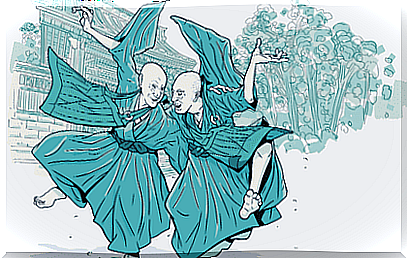How To Defeat An Enemy According To Zen Buddhism

This point of view may seem very strange to our culture, unlike the culture of Zen Buddhism, for example. Unfortunately, in general, we associate victory over our detractors with a triumph which should make us happy. The idea that results are more important than processes dominates, as does the idea that personal exhilaration is better than joint growth.
The problem is that defeating an enemy in order to nullify or harm them is only a temporary and very relative triumph. Basically, we feed this external enemy, just like the most negative part of our being. We may get immediate or specific satisfaction, but at the same time we will have strengthened all the destructive emotions in ourselves and in others.
Defeat an internal or external enemy?
Enemies can be external or internal. Zen tells us that internal enemies are much more dangerous and destructive than external enemies. The internal enemies are anger, pride, hatred, etc. All these passions are able to blind us and push us to commit real follies. Actions that are far from resembling us.
External enemies, on the other hand, have limited power over us … Unless we let them get into our lives too much. They are the ones who win when they manage to activate our internal enemies. Behind these states of anger or hatred, we lose the main tool that we benefit from: our intelligence.
Therefore, the Orientals teach us that it is not possible to defeat the external enemy without first having conquered the internal enemy. If we fail to do so, we remain at the mercy of the influence and determination of our external enemies. In other words, we offer them a triumph.

The real enemy
Zen philosophy also invites us to analyze who is the real enemy. She tells us that it is not really this person invaded by envy, selfishness or ambition and who wants to hurt us. Deep down, we are dealing with envy, selfishness, ambition or any other destructive feeling. Such feelings and passions are found inside the other person, but they can also dwell within us.
So, defeating the enemy means defeating these basic feelings and emotions, regardless of who is carrying them or their intentions. For Zen Buddhists, each of us contributes to creating more order or chaos in the universe, depending on how we act.
Conflict leads to chaos. And sooner or later chaos ends up affecting us personally. Every action generates a reaction and actions of hatred only increase hatred. Zen invites us to conquer the enemy and not to defeat him. Conflict is always superfluous and wears us out too much. It also brings about greater decadence.

Defeat the enemy
According to Zen, all actions intended to defeat the enemy must be thought out in order to neutralize him. You have to block your possibilities for action. Let’s take an example. If someone makes an offensive comment and you don’t let that offend, you’ve neutralized that enemy. If someone seeks to hurt you and if you put understanding before rejection, you will begin to build the barrier to block these people.
This is impossible to achieve if we have not done some work on ourselves. This work consists of taking a certain distance from these negative passions and feelings. It is also necessary to fill them with compassion and to be able to see the shortcomings and limitations of those who move forward in life wanting to harm others.
As in Zen philosophy, martial arts highlight this principle. Whoever manages to avoid the fight wins. If the two sides profit from the confrontation, we can speak of victory. The strategy is for the enemy to realize that he has used his forces for nothing. That his struggle is useless because his hatred does no harm to the other: it only leads him to use his energy in vain.










